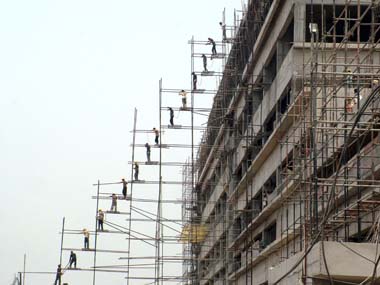With rising interest rates, slowing sales, a crippling liquidity crunch and exit of black money from the real estate prior to elections, India’s top developers are in for a tough ride as they might be forced to generate liquidity, especially in Delhi-NCR and the Mumbai Metropolitan Region.
Inventories at all-time high
Not only are real estate inventories (supply of readyhouses) in the residential market at an all-time high, but a_Business Standard_ analysis of 19 listed realty firms from the BSE-500 index shows that despite net sales remaining flat at the end of March 2013, these top builders are sitting on huge unsold real estate stock worth Rs 58,000 crore which could take more than two years to sell.
According to the report, DLF, India’s largest listed real estate developer, accounts for almost a third of the inventory worth Rs 17,600 crore. As ofend March 2013,HDIL had unsold flats worth Rs 12,043 crore, more than six times its net sales during 2012-13. Meanwhile, Indiabulls Real Estate had an unsold inventory worth Rs 5,111 crore, nearly four times its 2012-13 net sales.( Read more here).
Jones Lang Lasalle, in its latest report, says builders in Mumbai are sitting on an inventory of 48 months. Delhi is sitting on an inventory of 23 and Bangalore on 25 months, way above the comfortable level of 14-15 months.
“As a result, the ability of the market to cling to current prices is under severe stress,” said Ashutosh Limaye, head, research and real estate intelligence service, Jones Lang LaSalle India.
For Pankaj Kapoor, MD of real estate consultancy firm Liases Foras, eight months is adecent inventory level. “The moment it hits 8 months or more, it means builder has to borrow money to fund projects, which implies that he is highly leveraged,” he said.
[caption id=“attachment_1127487” align=“alignleft” width=“380”]  Reuters[/caption]
And not just inventory, even new launches have been slow, implying that there are no buyers in the market.
Data from real estate firm PropEquity shows that of the committed supply of 406,539 housing units, only 143,838 had been completed as of July 2013.
“Looking at the current status of the economy, high cost of construction, high interest rates and the liquidity crunch being faced by the developers, a few projects are likely to get delayed and spill over to the next year,” PropEquity CEO Samir Jasuja, was quoted as saying in a another BS report.
No funding options for builders
Banks are slowing their exposure to the sector with builders having to depend upon black money or on private players such as private equity firms and non-banking finance companies to finance projects.Citing a study by the Centre for Global Development which found that globally cement prices (proxying for construction activity) have fallen systemically during elections, a Hindu Business Line article says that in India too black money may be sucked out of this sector in the months leading up to the election, which may further reduce financing options for developers or force them to sell their inventory at a discount.
Moreover, todayno investor wants to put in more money as the PE firms whoinvested 3-4 years ago are sitting on either flat or negative returns and are looking to cut their losses and exit.
So with investors staying away until the elections are over, builders were dependent on using buyers’ credit quality to get financing at a cheaper cost.
But after the RBI put a stop to the dubious 80:20 and 75:25 schemes, builders will have little choice but to let property prices fall. The only silver lining for realtors was the hope that a depreciating rupee would lure NRIs to invest in Indian real estate. But on the contrary, people are sitting on the fence as thereis no stability in the rupee. The fear is that if it depreciates further, investors will lose out.
And with the proposed Real Estate Regulatory Bill, where developers are expected to keep considerable portion of sales in escrow account for a majority of the construction period, finance cost for developers is expected to increase, according to Anuj Puri, Chairman and Country Head, Jones Lang LaSalle India.
“This, along with the increase in cost of construction and the already challenging economic scenario, is expected to affect the profit margins of developers,” added Puri.
Already new projects are selling at a discounted price, while resale inventory has increased nearly 30 percent over the last six months.


)
)
)
)
)
)
)
)
)



